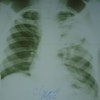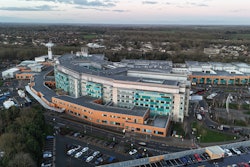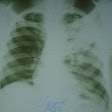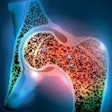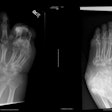An investigation into the death of a 9-month-old baby at Northampton General Hospital, U.K., has highlighted serious shortcomings in radiology on-call provision and the availability of emergency imaging exams.
Iona Buckingham died after complications from bronchiolitis. In a report published on 19 January, coroner Jonathan Dixey said the hospital had missed opportunities to administer an antibiotic and carry out x-ray and chest ultrasound exams. Dixey noted that the hospital's lack of access to a pediatric radiologist outside of normal working hours on Mondays and Fridays may be due to a lack of funding. He also expressed concern that children with pneumonia who are not improving after 48 hours of treatment do not always get the scan they need and there is a risk of future deaths.
According to the coroner's report, Iona was admitted to hospital for oxygen therapy and feeding support on 28 November 2022. A chest x-ray performed the next day showed right upper lobe pneumonia and some pleural effusion. She was escalated from high-flow nasal cannula oxygen to continuous positive airway pressure (CPAP) and continued to receive antibiotics and her condition appeared to improve, so she was stepped down from high-dependency care.
At around 2 p.m. on Saturday 3 December, the baby was in distress and struggling to breathe, and she was upgraded to a higher level of respiratory support, Dixey wrote. At around 10 a.m. the following day, a chest x-ray showed a "whiteout" to the right lung and pleural effusion, and she was moved to the High Dependency Unit and returned to CPAP. Staff inserted an endotracheal tube (ETT), but a further x-ray showed the ETT was not properly located and needed to be re-sited. In doing so, the ETT became dislodged and the patient went into cardiac arrest. Despite attempts to resuscitate her, Iona died at 6.37 p.m. on 4 December.
The coroner pointed out that a serious incident investigation conducted by Northampton General Hospital National Health Service (NHS) Trust revealed that on 29 November 2022, the East Midlands Paediatric Critical Care Network had issued the following advice:
"We would like to inform you of a high number of cases of highly aggressive sepsis, linked to empyema, and positive culture for Group A Streptococcus in the region. This has caused significant morbidity and mortality. We advise early referral, aggressive management, high dose intravenous antibiotics, and early drainage of empyemas. Please have a low threshold for investigating any child with a secondary respiratory deterioration, especially with new onset of fever. Chest X-Ray and ultrasound will be beneficial."
Dixey noted he had heard evidence from the region's clinical director of the Child Health Directorate, who was also a consultant pediatrician. The coroner wrote that he was satisfied that the NHS Trust had taken action in respect of the police advice and had reflected upon the circumstances of Iona's death, but he remained concerned that there was a risk of future patient deaths if further action was not taken.
The clinical director also told the coroner that as a district general hospital, Northampton does not have access to a pediatric radiologist outside of 9 a.m.-5 p.m. on Mondays and Fridays. Dixey noted that in Iona's case, a specialist in intensive therapy and anesthesia "was able to perform an ultrasound scan at around 2 p.m. on (Sunday) 4 December 2022, however this is not a facility that would routinely be available to the Trust and was not, in any event, part of that clinician's core duties."
"I am concerned that a very unwell child who may require a chest ultrasound may not receive one 'immediately' and in fact may have to wait for a considerable period of time. For example, if the need arose over a weekend, that child may not receive an ultrasound scan for up to 48 hours," he continued. "I understand a reason why Northampton General Hospital does not have access to a paediatric radiologist outside of 9 a.m.-5 p.m. on Mondays and Fridays may be due to the funding that is available. I am therefore sending this letter to the NHS Northamptonshire Integrated Care Board and to NHS England."
According to a BBC News article posted on 26 January 2024, a hospital spokesperson said: "We are reviewing the recommendations from the coroner and will be responding within the specified time frame. We are working closely with all system partners across Northamptonshire to discuss the findings and will work together to assess and implement any actions that can be taken." Northampton General Hospital has until 8 March to respond to the report, BBC News added.
Editor's note: Homepage photo courtesy of Bigred / Alamy Stock Photo.



